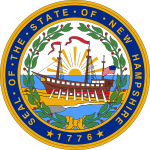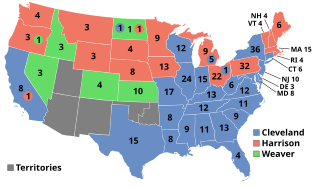| |||||||||||||||||
| |||||||||||||||||
 County results Currier: 40–50% 50–60% Hill: 40–50% 50–60% | |||||||||||||||||
| |||||||||||||||||
The 1884 New Hampshire gubernatorial election was held on November 4, 1884. Republican nominee Moody Currier defeated Democratic nominee John M. Hill with 50.33% of the vote.
| |||||||||||||||||
| |||||||||||||||||
 County results Currier: 40–50% 50–60% Hill: 40–50% 50–60% | |||||||||||||||||
| |||||||||||||||||
| Elections in New Hampshire |
|---|
 |
The 1884 New Hampshire gubernatorial election was held on November 4, 1884. Republican nominee Moody Currier defeated Democratic nominee John M. Hill with 50.33% of the vote.
Major party candidates
Other candidates
| Party | Candidate | Votes | % | ±% | |
|---|---|---|---|---|---|
| Republican | Moody Currier | 42,514 | 50.33% | ||
| Democratic | John M. Hill | 39,637 | 46.92% | ||
| Prohibition | Larkin D. Mason | 1,803 | 2.13% | ||
| Greenback | George Carpenter | 490 | 0.58% | ||
| Majority | 2,877 | ||||
| Turnout | |||||
| Republican hold | Swing | ||||

Presidential elections were held in the United States on November 4, 1884. Democratic Governor Grover Cleveland of New York narrowly defeated Republican James G. Blaine of Maine. It was set apart by mudslinging and personal allegations that eclipsed substantive issues, such as civil administration change. Cleveland was the first Democrat elected president of the United States since James Buchanan in 1856, the first to hold office since Andrew Johnson left the White House in 1869, and the last to hold office until Woodrow Wilson, who began his first term in 1913. For this reason, 1884 is a significant election in U.S. political history, marking an interruption in the era when Republicans largely controlled the presidency between Reconstruction and the Great Depression.

Presidential elections were held in the United States on November 8, 1892. In the fourth rematch in American history, the Democratic nominee, former president Grover Cleveland, defeated the incumbent Republican President Benjamin Harrison. Cleveland's victory made him the first president in American history to be elected to a non-consecutive second term, a feat not repeated until Donald Trump was elected in 2024. The 1892 election saw the incumbent White House party defeated in three consecutive elections, which did not occur again until 2024.

The Commission on Presidential Debates (CPD) is a nonprofit corporation established in 1987 under the joint sponsorship of the Democratic and Republican political parties in the United States. The CPD sponsors and produces debates for U.S. presidential and vice-presidential candidates and undertakes research and educational activities relating to the debates. Between 1988 and 2020, the CPD organized all general election presidential debates.

The 2008 South Carolina Senate election were held on Tuesday, November 4, 2008. The primary elections were held on June 10 and the runoff elections were held two weeks later on June 24. The current composition of the state delegation is 27 Republicans and 19 Democrats. Senators are elected for four-year terms, all in the same year.
The 1884 Democratic National Convention was held July 8–11, 1884 and chose Governor Grover Cleveland of New York their presidential nominee with the former Governor Thomas A. Hendricks of Indiana as the vice presidential nominee.

A general election was held in the U.S. state of Arkansas on November 4, 2014. All of Arkansas' executive officers were up for election as well as a United States Senate seat, and all of Arkansas' four seats in the United States House of Representatives. Primary elections were held on May 20, 2014, for offices that need to nominate candidates. Primary runoffs, necessary if no candidate wins a majority of the vote, were held on June 10, 2014.
Debra Moody is an American politician and a Republican member of the Tennessee House of Representatives representing District 81 since January 8, 2013.

The Columbus mayoral election of 1975 was the 75th mayoral election in Columbus, Ohio. It was held on Tuesday, November 4, 1975. Democratic party nominee John Rosemond was defeated by incumbent Republican mayor Tom Moody.

The 2016 United States House of Representatives elections in Arkansas were held on Tuesday, November 8, 2016, to elect the four U.S. representatives from the state of Arkansas, one from each of the state's four congressional districts. The elections coincided with the elections of other federal and state offices, including President of the United States. The primaries were held on March 1.

The 2018 Florida Attorney General election took place on November 6, 2018, to elect the Attorney General of Florida. Incumbent Republican attorney general Pam Bondi was term-limited and could not seek a third consecutive term.

The 1956 United States presidential election in Alabama took place on November 6, 1956, as part of the 1956 United States presidential election. Alabama voters chose eleven representatives, or electors, to the Electoral College, who voted for president and vice president. In Alabama, voters voted for electors individually instead of as a slate, as in the other states.

A general election was held in the U.S. state of Vermont on November 5, 2002. All of Vermont's executive officers were up for election as well as Vermont's at-large seat in the United States House of Representatives.

The 1884 Michigan gubernatorial election was a state election held on November 4, 1884. Republican nominee Russell A. Alger defeated incumbent Josiah W. Begole, who ran on a fusion ticket, representing both the Democratic and Greenback, with 47.67% of the vote.

The 1884 United States presidential election in Tennessee took place on November 4, 1884, as part of the 1884 United States presidential election. Tennessee voters chose twelve representatives, or electors, to the Electoral College, who voted for president and vice president.

The 1884 Colorado gubernatorial election was held on November 4, 1884. Republican nominee Benjamin Harrison Eaton defeated Democratic nominee Alva Adams with 50.74% of the vote.

The 1884 Kansas gubernatorial election was held on November 4, 1884. Republican nominee John Martin defeated Democratic incumbent George Washington Glick with 55.34% of the vote.

The 1884 Connecticut gubernatorial election was held on November 4, 1884. Republican nominee Henry Baldwin Harrison defeated Democratic incumbent Thomas M. Waller with 48.12% of the vote.

The 1896 North Carolina gubernatorial election was held on November 3, 1896. Republican nominee Daniel Lindsay Russell defeated Democratic nominee Cyrus B. Watson with 46.52% of the vote. This was the only election in North Carolina between 1872 and 1972 in which the Republican nominee won the governor's office, and the only one until 2016 in which no candidate received over 50% of the vote.

The 1886 Wisconsin gubernatorial election was held on November 2, 1886.

The 1912 Wisconsin gubernatorial election was held on November 5, 1912. Primary elections were held on September 3, 1912.